Rats are known for their insatiable appetite and will eat almost anything they can get their paws on. However, when it comes to feeding rats, it’s essential to ensure that they are consuming a balanced diet that meets their nutritional requirements. One food that may come to mind during the fall season is pumpkin. But, can rats eat pumpkin, and is it safe for them to consume?

Pumpkin is a nutrient-dense food that is low in calories and high in fiber, making it an excellent addition to a rat’s diet. Rats can eat pumpkin, and it can provide them with many health benefits. However, it’s crucial to ensure that the pumpkin is fresh, ripe, and free of any mold or rot. Additionally, while pumpkin is safe for rats to consume, it should not make up the majority of their diet. A balanced diet that includes a variety of fruits, vegetables, and protein sources is essential for a rat’s overall health and well-being.
Benefits of Pumpkin in a Rat’s Diet
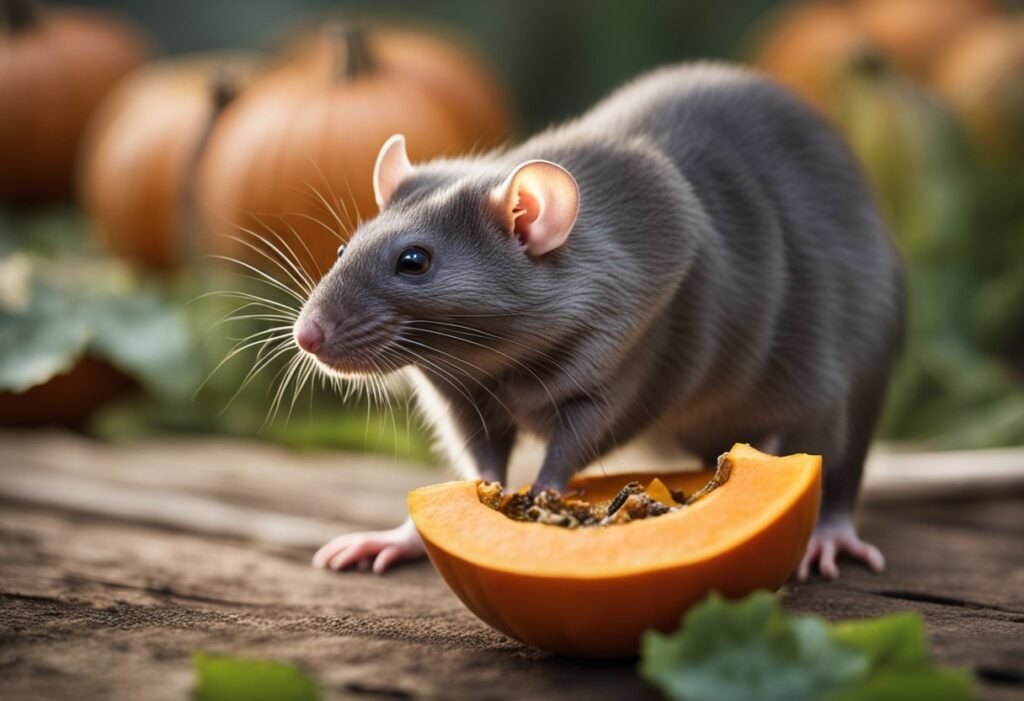
Including pumpkin in a rat’s diet can provide a range of benefits for their overall health and well-being. Here are a few reasons why:
1. Nutrient-rich
Pumpkins are a good source of nutrients that are essential for a rat’s health, such as Vitamin A, Vitamin C, and potassium. These nutrients can help boost their immune system, maintain healthy skin and fur, and support healthy organ function.
2. High in Fiber
Pumpkins are also high in fiber, which can help regulate a rat’s digestive system. This can help prevent constipation and other digestive issues that can arise from a lack of fiber in their diet.
3. Low in Calories
Pumpkins are a low-calorie food, which can be beneficial for rats that are prone to obesity. Including pumpkin in their diet can help them feel full without consuming too many calories, which can help maintain a healthy weight.
4. Variety in Diet
Adding pumpkin to a rat’s diet can also provide variety and enrichment. Rats enjoy exploring new foods and textures, and adding pumpkin can provide a new taste and texture for them to enjoy.
Overall, incorporating pumpkin into a rat’s diet can provide a range of benefits for their health and well-being. It is important to note that pumpkin should not be the sole source of nutrition for rats and should be given in moderation as part of a balanced diet.
Nutritional Content of Pumpkin
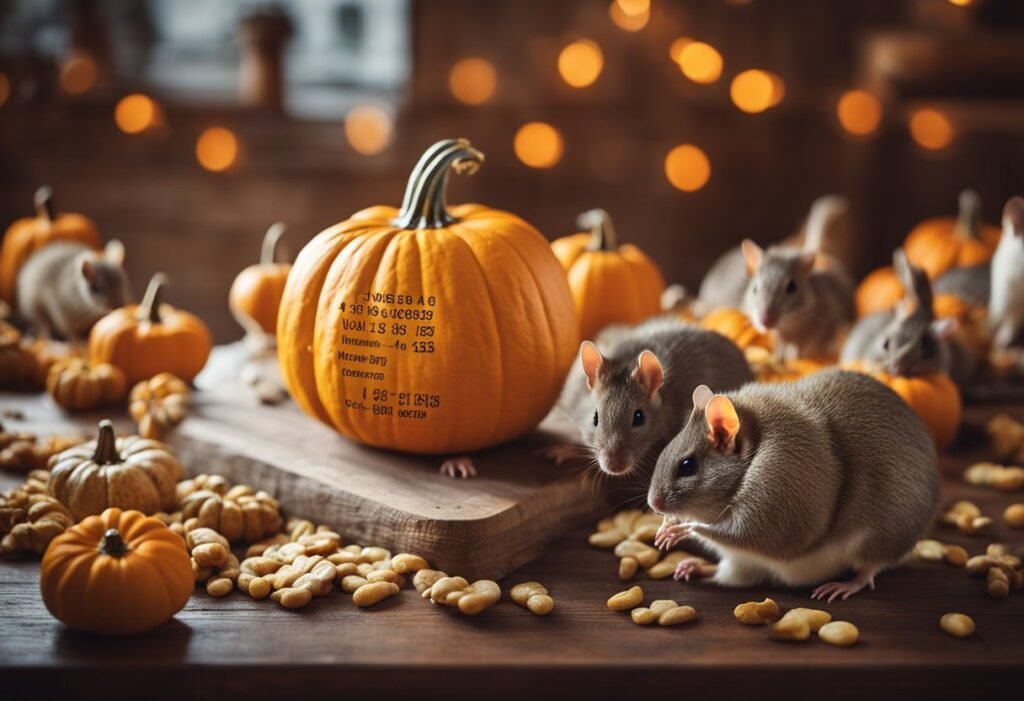
Pumpkins are a great source of vitamins and minerals that are essential for a rat’s health. Here’s a breakdown of the nutritional content of pumpkin:
Vitamins
Pumpkins are high in vitamin A, which is important for maintaining healthy skin, vision, and immune system function. They also contain vitamins C and E, which are antioxidants that help protect cells from damage.
Minerals
Pumpkins are a good source of potassium, which is important for maintaining healthy blood pressure and heart function. They also contain magnesium, which is important for bone health, and iron, which is essential for red blood cell production.
Fiber
Pumpkins are high in fiber, which is important for digestive health. Fiber helps regulate bowel movements and can prevent constipation.
Calories
Pumpkins are low in calories, which makes them a great snack for rats. One cup of pumpkin contains only 49 calories.
Overall, pumpkins are a nutritious addition to a rat’s diet. They are low in calories and high in vitamins, minerals, and fiber. However, it’s important to remember that pumpkin should be given in moderation as too much can cause digestive upset.
How to Prepare Pumpkin for Rats
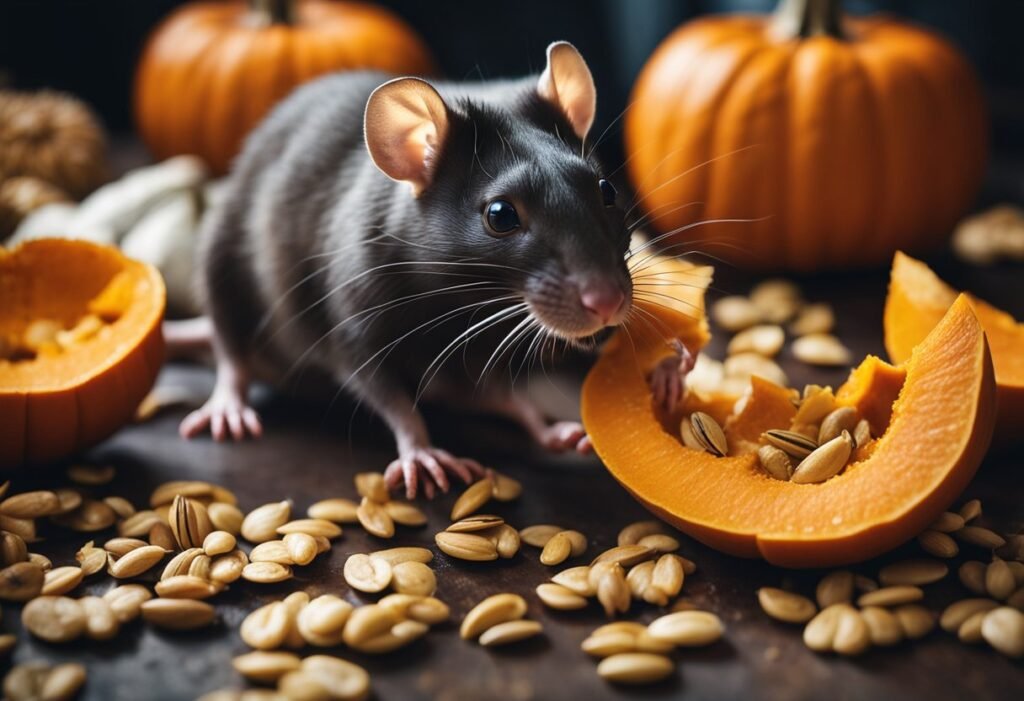
Preparing pumpkin for rats is a simple process that can be done in a few easy steps. Here’s what you need to do:
- Choose a fresh, ripe pumpkin that is free of any signs of rot or mold.
- Wash the pumpkin thoroughly to remove any dirt or debris.
- Cut the pumpkin into small, bite-sized pieces that are easy for your rat to chew and digest.
- Remove the seeds and stringy pulp from the center of the pumpkin. While rats can eat pumpkin seeds, they are high in fat and should be given in moderation.
- Cook the pumpkin by steaming, boiling, or baking it until it is soft and tender. Avoid adding any seasonings or spices, as these can be harmful to rats.
- Allow the pumpkin to cool to room temperature before serving it to your rat.
Overall, pumpkin can be a healthy and nutritious addition to your rat’s diet when prepared properly. By following these simple steps, you can ensure that your rat is getting the nutrients they need without any harmful additives or seasonings.
Appropriate Serving Sizes
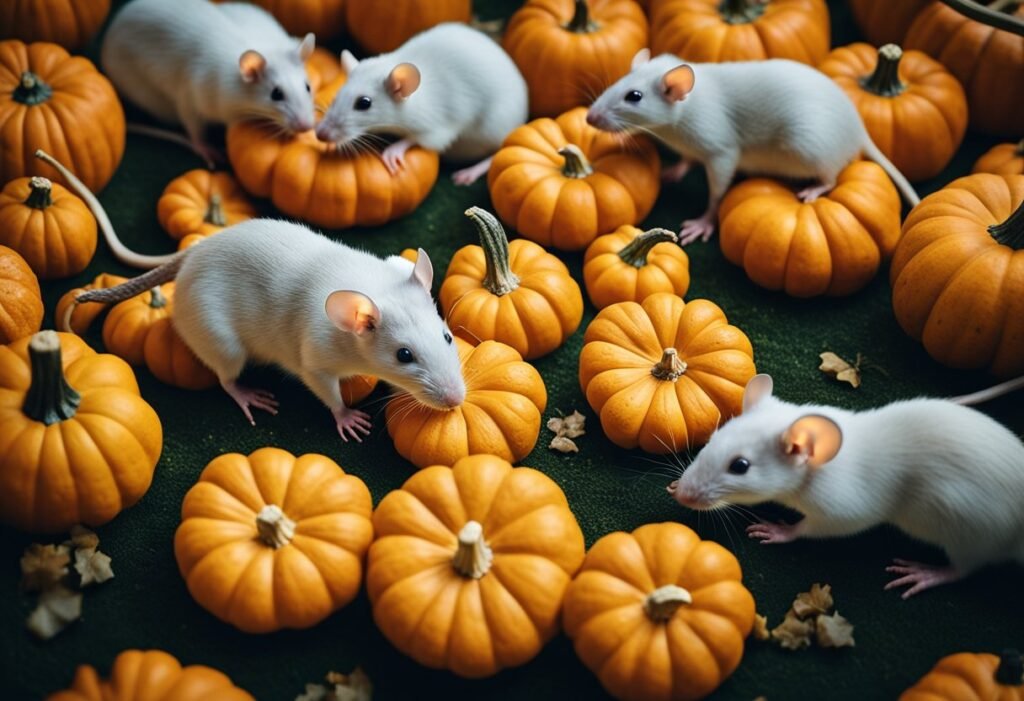
When it comes to feeding pumpkin to rats, it’s important to keep in mind the appropriate serving sizes. While pumpkin can be a healthy addition to a rat’s diet, too much of it can cause digestive issues.
As a general rule, a small amount of pumpkin should be given as a treat or supplement to a rat’s regular diet. We recommend offering a slice of pumpkin that is about the size of a quarter once or twice a week. This small amount is enough to provide the nutrients that rats need without causing any digestive problems.
It’s also important to note that pumpkin seeds can be a choking hazard for rats. We recommend removing the seeds before feeding pumpkin to your rat. Additionally, pumpkin should never be the sole source of nutrition for your rat, but rather a supplement to a balanced diet.
In summary, while pumpkin can be a healthy addition to a rat’s diet, it’s important to keep the serving sizes small and to remove the seeds before feeding. By following these guidelines, you can safely and responsibly incorporate pumpkin into your rat’s diet.
Risks and Considerations
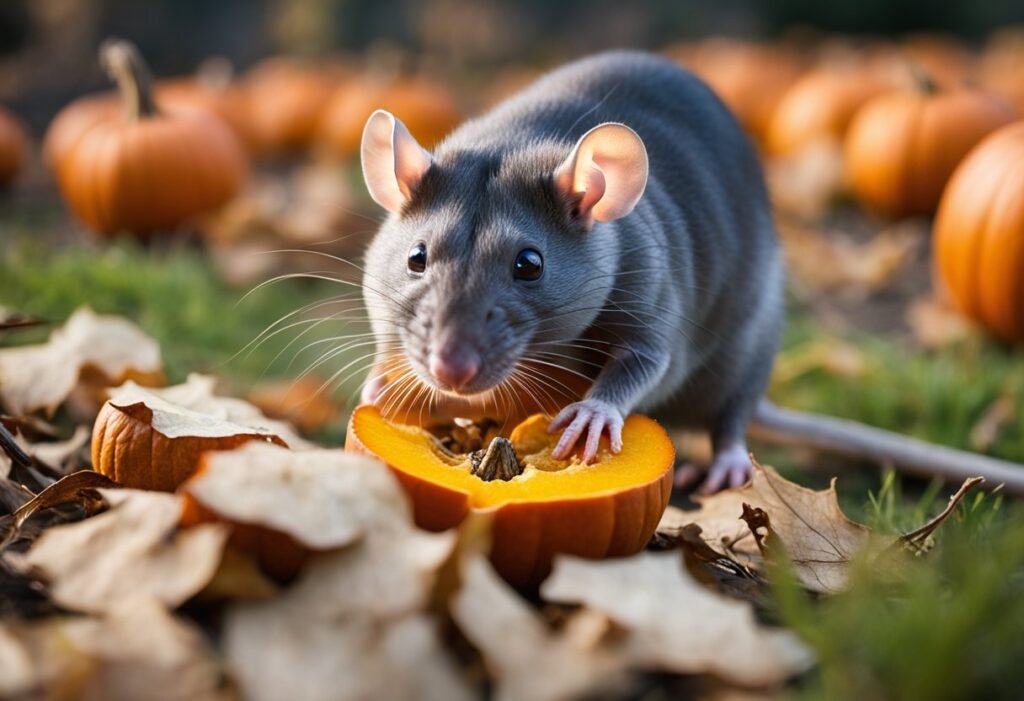
When feeding pumpkin to rats, there are some risks and considerations that should be taken into account. Here are some important points to keep in mind:
1. High Sugar Content
Pumpkin is a fruit that contains a high amount of natural sugars, which can be harmful to rats if consumed in large quantities. While a small amount of pumpkin is unlikely to cause any harm, it is important to monitor your rat’s intake and ensure that they are not overindulging.
2. Potential for Choking
Rats have small throats and can be prone to choking on large pieces of pumpkin or other fruits and vegetables. To prevent this, it is recommended to cut pumpkin into small, bite-sized pieces before feeding it to your rat.
3. Pesticides and Chemicals
It is important to ensure that the pumpkin you are feeding your rat is free from pesticides and other harmful chemicals. If possible, choose organic pumpkin or wash it thoroughly before feeding it to your rat.
4. Nutritional Imbalance
While pumpkin can be a healthy addition to a rat’s diet in moderation, it should not be the sole source of nutrition. Rats require a balanced diet that includes a variety of fruits, vegetables, protein, and carbohydrates.
Overall, pumpkin can be a safe and healthy treat for rats when fed in moderation and with consideration for the potential risks. As with any new food, it is important to introduce pumpkin gradually and monitor your rat’s reaction.
Types of Pumpkin That Rats Can Eat
When it comes to feeding rats, pumpkin can be a great addition to their diet. However, not all types of pumpkin are safe for rats to eat. Here are some types of pumpkin that rats can safely consume:
1. Sugar Pumpkins
Sugar pumpkins are small, sweet pumpkins that are commonly used in pies and other baked goods. These pumpkins are safe for rats to eat and can be a great source of vitamins and minerals.
2. Butternut Squash
Butternut squash is a type of pumpkin that is high in fiber and vitamin A. Rats can safely consume butternut squash, and it can be a great addition to their diet.
3. Acorn Squash
Acorn squash is another type of pumpkin that rats can safely consume. It is rich in vitamins and minerals and can provide rats with a healthy source of nutrition.
4. Kabocha Squash
Kabocha squash is a Japanese pumpkin that is rich in vitamins and minerals. Rats can safely consume kabocha squash, and it can be a great addition to their diet.
It is important to note that rats should not be fed pumpkin seeds or the stem of the pumpkin. These parts of the pumpkin can be difficult for rats to digest and can cause digestive issues. Additionally, rats should only be fed pumpkin in moderation as too much can lead to diarrhea and other health issues.
Foods to Avoid Feeding Rats
As responsible pet owners, we must ensure that our pets are getting the right kind of food. While rats are omnivores and can eat a variety of foods, there are certain foods that should be avoided. Here are some foods to avoid feeding rats:
1. Processed Foods
Processed foods are high in sugar, salt, and preservatives, which can lead to health problems in rats. Avoid feeding your rats processed foods such as candy, chips, and other junk food.
2. Raw Beans
Raw beans contain a toxin called lectin, which can be harmful to rats. Cooked beans are safe for rats to eat, but make sure they are thoroughly cooked.
3. Citrus Fruits
Citrus fruits such as oranges and lemons are high in acid, which can cause digestive problems in rats. It is best to avoid feeding your rats citrus fruits.
4. Avocado
Avocado contains persin, which can be toxic to rats. Avoid feeding your rats avocado.
5. Chocolate
Chocolate contains theobromine, which can be toxic to rats. Even a small amount of chocolate can be harmful to rats.
6. Onions and Garlic
Onions and garlic contain compounds that can damage a rat’s red blood cells, leading to anemia. It is best to avoid feeding your rats onions and garlic.
By avoiding these foods, you can help ensure that your rats stay healthy and happy. Remember to always provide your rats with fresh water and a balanced diet.
Monitoring Your Rat’s Health
As responsible rat owners, it is important to monitor our pets’ health regularly. This includes observing their behavior, appetite, and physical appearance. Here are some tips to help keep your rat healthy:
1. Regular Vet Check-Ups
We recommend taking your rat to the vet at least once a year for a check-up. Your vet can perform a physical examination and provide advice on any health concerns you may have.
2. Balanced Diet
A balanced diet is essential for your rat’s health. In addition to their regular diet, you can offer occasional treats like pumpkin. However, it is important to monitor their intake and ensure they are not overeating.
3. Hydration
Rats require access to clean, fresh water at all times. Make sure to check their water bottle or bowl regularly to ensure it is full and clean.
4. Clean Living Environment
A clean living environment is crucial for your rat’s health. Regularly clean their cage and bedding to prevent the buildup of bacteria and other harmful substances.
5. Exercise
Rats are active animals and require regular exercise to maintain their health. Provide toys and opportunities for them to climb and explore outside of their cage.
By following these tips, you can help ensure your rat stays healthy and happy. If you notice any changes in their behavior or physical appearance, contact your vet immediately.
Frequently Asked Questions
What are the benefits of feeding pumpkin to rats?
Pumpkin is a nutritious food that can provide a variety of health benefits to rats. It is a good source of fiber, which can aid in digestion and promote healthy bowel movements. It also contains vitamins A and C, which can help boost the immune system and promote healthy skin and fur.
How should pumpkin be prepared for rat consumption?
Pumpkin can be fed to rats cooked or raw. If feeding raw pumpkin, make sure to wash it thoroughly and remove any seeds or skin. Cooked pumpkin can be mashed or pureed and mixed with other rat-friendly foods.
Are there any risks associated with rats eating pumpkin?
In general, pumpkin is a safe and healthy food for rats. However, it is important to avoid feeding them pumpkin that has gone bad or has been contaminated with mold or bacteria. Additionally, pumpkin seeds should be fed to rats in moderation, as they are high in fat.
Can pumpkin seeds be included in a rat’s diet, and how?
Pumpkin seeds can be a tasty and healthy addition to a rat’s diet when fed in moderation. They can be fed raw or roasted, but should be unsalted. It is important to limit the amount of pumpkin seeds fed to rats, as they are high in fat.
What quantity of pumpkin is safe for a rat to eat?
The amount of pumpkin a rat can safely eat depends on the individual rat’s size and dietary needs. As a general rule, it is best to start with a small amount of pumpkin and gradually increase the amount over time. A good starting point is about one teaspoon of mashed or pureed pumpkin per day.
Aside from pumpkin, what other vegetables can rats safely eat?
Rats can safely eat a variety of vegetables, including leafy greens like kale and spinach, as well as root vegetables like carrots and sweet potatoes. It is important to introduce new foods gradually and monitor your rat’s reaction to them to ensure they are well-tolerated.





